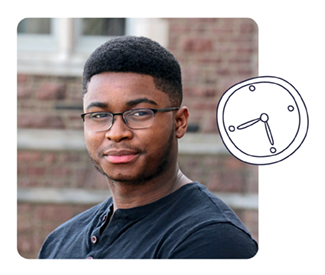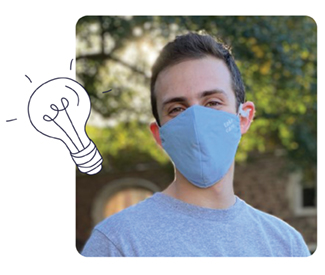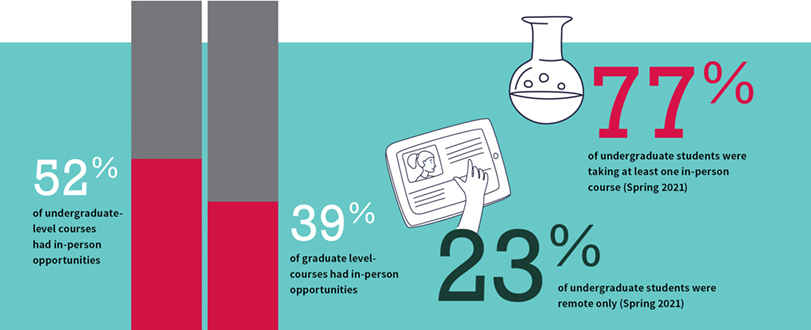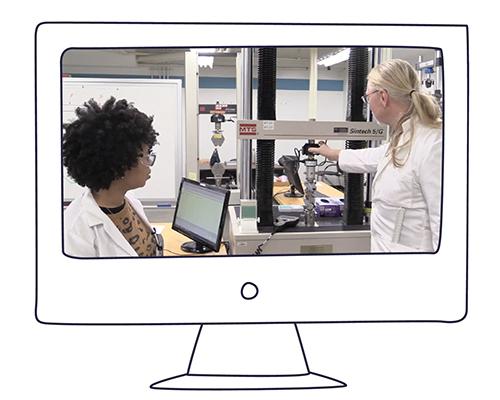Virtual becomes reality
How faculty, staff and students adapted to remote instruction without losing momentum
On March 11, 2020, while Washington University in St. Louis students were on spring break, Chancellor Andrew D. Martin told the WashU community that the remainder of the spring semester would be conducted remotely due to the COVID-19 pandemic. McKelvey School of Engineering students had to quickly adjust their learning styles from in-person to online, and faculty had to convert their courses to a virtual format without causing too much disruption or losing momentum.
During the extended two-week spring break, 239 McKelvey Engineering instructors and staff members prepared 203 unique courses to be taught remotely. They also trained 16 staff members to serve as moderators for classes taught on Zoom. Thanks to some foresight by school administration, there had been some preparation that made the transition smoother.
Jason Crandall, who joined the school in 2016 as director of learning design and innovation to incorporate technology that would enhance the student learning experience, co-chaired a university search committee that selected Zoom and Kaltura for video conferencing and learning management systems, respectively.
“If those tools hadn’t been available before the pandemic, I’m not sure we could have weathered it the way we did,” said Crandall, director of learning design and innovation.
“We had been encouraging faculty to include more technology in how they taught, and because we already had a policy in place that required every course to be on Canvas, we were far more ready. It was very prescient of Dean (Aaron) Bobick to have that focus in place and to provide the supply before the demand was there.”
While the school was executing emergency remote instruction during the Spring 2020 semester, a planning committee, which included Crandall; Ben Geers, senior director of computing & IT services; Joe Scherrer, executive director of professional education & program director; and Jay Turner, professor of energy, environmental & chemical engineering and vice dean of education, focused on the Fall 2020 semester.
“We laid out numerous scenarios and looked at our strengths and vulnerabilities under these scenarios so that if the university pivoted in a certain direction, we wouldn’t be caught blindsided,” Turner said.
As a result, Crandall and Meghann Pytka, one of two instructional specialists hired to help with the transition to virtual learning, created an online summer course for faculty to help them convert their courses from in-person to a hybrid or all-remote course.
“That course was the cornerstone of our support to instructors,” Turner said. “It gave instructors interesting insight into what it’s like to be an online student. There were a lot of aha moments, discovering the opportunities and challenges the new teaching modalities provided.”
In a survey at the end of the spring 2020 semester, students reported being mostly to very satisfied with quality of teaching both before and after the transition to emergency remote instruction, with only a 2% decline in satisfaction after the transition. In Fall 2020, students reported difficulties with the lack of personal interaction with classmates and faculty, time management and an increased workload. In many cases, Turner said, many exams were replaced with more frequent quizzes or projects, keeping students in test-mode all semester.
For the Fall 2020 semester, final exams were held after the New Year and were fully remote. Some were conducted synchronously with video conferencing to simulate the classroom environment, while others were “take-home” exams. Some instructors took advantage of online testing applications, such as Respondus, to assist with exam proctoring.
Students have mostly taken the change to remote learning in stride while acknowledging its opportunities and challenges.

“Logging into an online lecture has been very convenient, especially when the weather is poor,” said Kelechi Achilefu, a junior majoring in mechanical engineering and president of EnCouncil for 2020-2021. “However, with hybrid learning, a common problem I hear about is establishing boundaries for when to work. Oftentimes, I find myself working for much longer than I need to simply because the work always appears to be there. For people like me, it is much easier to experience things like burnout when approaching school without taking time to separate from work, so it is something I focus on every week.”
As EnCouncil president, Achilefu said the Executive Board decided to keep all of its programming remote for this academic year to keep members safe, which led them to be more creative.

“Although I personally miss the programs we typically hold, like Vertigo and Cheap Lunch, having time to focus on getting to know the members of EnCouncil is invaluable moving forward,” he said.
Rosie Dutt, a doctoral student in imaging science, said she preferred the remote format because it allowed her to work on her own schedule and to get involved with a variety of groups, including joining the national leadership team for 500 Women Scientists and The Journal of Science Policy and Governance.

Logan Press, a senior majoring in computer science, described his virtual learning experience as rigorous. “I’d have to be inventive in how I went about learning, which then empowered me to excel.
“Nearly all my classes are online, so it’s very taxing being inside the majority of the time,” he said. “I make sure to give myself time get out and bike through Forest Park or take a walk on campus to de-stress.”

Sophomore mechanical engineering student Alanna Bader described her fall semester as “challenging, peaceful and collaborative.
“I enjoy the flexibility of my class schedules with Zoom,” she said. “Often times, mornings are the worst for me due to my disability, so I am glad to have time dedicated to physical therapy and relieving pain before I start my schoolwork. Being able to stay home instead of traveling to campus has been beneficial for my health, as well, since I struggle with permanent spine issues from an injury.”

Engineering courses for Spring 2021
52% of undergraduate-level courses had in-person opportunities; 39% of graduate-level courses had in-person opportunities. 23% of undergraduate students were remote only and 77% were taking at least one in-person course
Of the 254 courses offered in Fall 2020, seven were in-classroom instruction; 102 were hybrid, offering both in-person and online options; and 145 were remote only. Of the 271 courses offered in Spring 2021, eight were in-classroom instruction; 105 were hybrid; 155 were remote only; one was online hybrid; and two were online. Teaching assistants served as Zoom moderators.
Some departments, such as mechanical engineering & materials science, had to change the way they presented lab experiments. Shaun Sellers and Sharniece Holland, both lecturers, teach MEMS 205, Mechanics and Materials Science Laboratory, a normally hands-on course that was fully online this fall through Canvas. Students were required to watch a video with Sellers and Holland performing the experiments, answer questions about the video, then attend a group meeting to discuss results and finish their lab report.

“We still wanted it to be an involved learning experience,” said Chiamaka Asinugo, lab & design course specialist in mechanical engineering & materials science and an alumna of the Dual Degree Program who earned a bachelor’s and a master’s in mechanical engineering from WashU in 2016. “We had them watch the video and gave them incomplete data. They had to request the rest of the data, then do the data analysis themselves.”
Sandra Matteucci, director of the Engineering Communications Center and senior lecturer, said her interactive and discussion-based courses had to change a lot.
“I had to restructure my whole curriculum in technical writing to only meet once a week, with half in class and half on Zoom,” she said. “It made me think through why we teach what we teach.”
Despite the separation and masks in class, the new class structure has sparked more creativity, Matteucci said.
“From my perspective, the presentations during the fall semester in leadership and ethics were among the best we’ve ever had,” she said. “The students said their barriers for collaboration are lower because they can meet anytime. We’ve tried hard, but the students have, too.”
Danielle Lacey contributed to this story.
Remote or online only: No in-person component to the course.
Online hybrid: Same as hybrid (in-person/online), except that it was offered this way pre-COVID.
Back to Engineering Momentum
